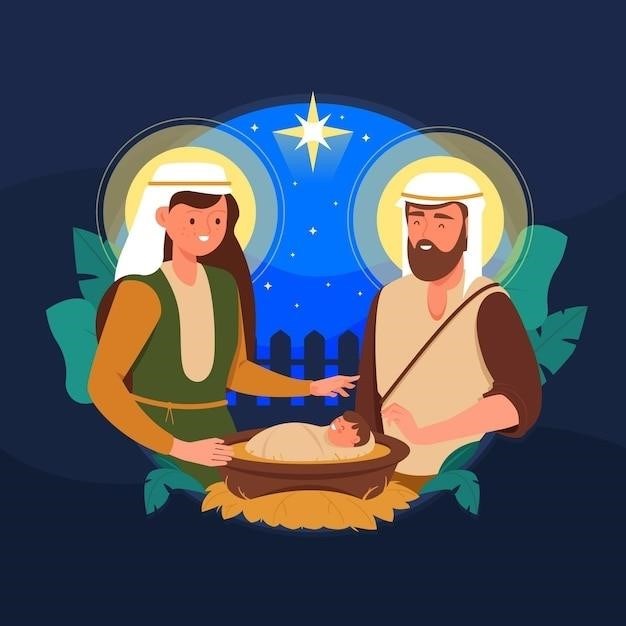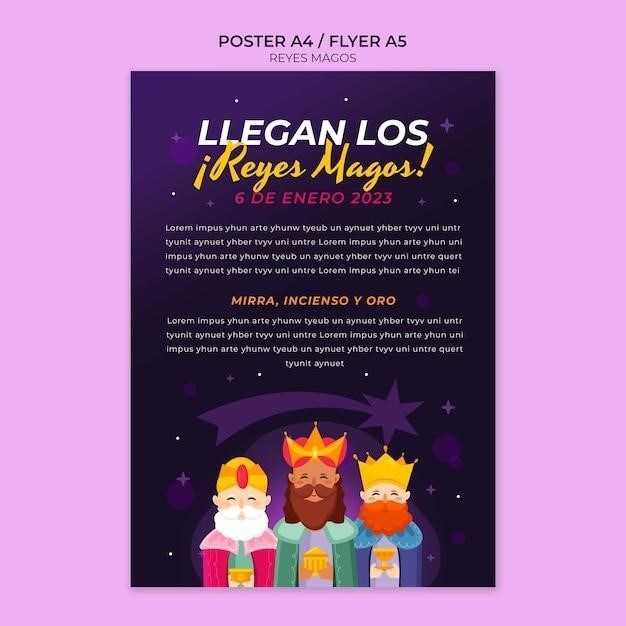The Birth of Jesus⁚ Questions and Answers
This article explores key questions surrounding the birth of Jesus, examining biblical accounts and theological implications․ It delves into the Virgin Birth, the Star of Bethlehem, the Wise Men, the Shepherds, and the Census, providing answers and insights into these significant events․
Introduction
The birth of Jesus Christ, a pivotal event in Christian history, is a source of both wonder and inquiry․ This article delves into the questions surrounding this extraordinary event, drawing on biblical accounts, historical context, and theological interpretations․ From the Virgin Birth to the star of Bethlehem, the arrival of the Wise Men, and the census that led Joseph and Mary to Bethlehem, we explore the mysteries and significance of Jesus’ birth․ This examination seeks to provide a comprehensive understanding of this pivotal moment in the Christian faith․

Why is the Birth of Jesus Important?
The birth of Jesus is central to the Christian faith because it marks the beginning of God’s plan to redeem humanity․ Christians believe that Jesus, born of a virgin, was both fully God and fully human․ His birth fulfilled Old Testament prophecies, signifying the arrival of the Messiah, a long-awaited savior who would bring salvation to all who believe․ The birth of Jesus is celebrated as Christmas, a time of joy, reflection, and spiritual renewal, reminding believers of God’s love and the hope of eternal life․
Key Questions about Jesus’ Birth
The birth of Jesus has sparked numerous questions and debates throughout history․ One central question is the nature of the Virgin Birth, exploring how a virgin could conceive and give birth to a child․ Another significant question centers around the Star of Bethlehem, its nature, significance, and role in guiding the Wise Men to Jesus․ The identity and motivations of the Wise Men, their journey, and the gifts they brought also raise intriguing questions․ The Shepherds’ role, their encounter with the angels, and the message they received are further points of inquiry․ Finally, the census, its purpose, and its connection to Joseph and Mary’s journey to Bethlehem are all subjects of ongoing discussion and exploration․
The Virgin Birth
The Virgin Birth, the miraculous conception and birth of Jesus by the Virgin Mary, is a cornerstone of Christian faith․ It’s described in the Gospels of Matthew and Luke, where the angel Gabriel announces to Mary that she will conceive and bear a son, despite being a virgin․ This event is seen as a fulfillment of Old Testament prophecy and a testament to the divine nature of Jesus․ The Virgin Birth is a central aspect of Christian theology, emphasizing Jesus’ unique status as both fully God and fully human; Its theological implications are profound, pointing to the divine intervention in human history and the power of God to transcend natural limitations․ The Virgin Birth is a cornerstone of Christian faith and a subject of ongoing discussion and theological exploration․
What Does the Bible Say?
The Bible, specifically the Gospels of Matthew and Luke, provides the foundational accounts of the Virgin Birth․ In Matthew 1⁚18-25, it’s explained that Mary was betrothed to Joseph, but before their union, she conceived by the Holy Spirit․ Joseph, initially troubled, was reassured by an angel in a dream that the child was conceived by the Holy Spirit and was to be named Jesus․ Luke 1⁚26-38 recounts the angel Gabriel’s visit to Mary, informing her of her miraculous pregnancy and the future significance of her son․ These narratives serve as the cornerstone of the Christian understanding of Jesus’ divine origin and the unique circumstances of his birth․ The Bible provides the foundation for the doctrine of the Virgin Birth, a central tenet of Christian faith․
What are the Theological Implications?
The theological implications of the Virgin Birth are profound․ It signifies Jesus’ unique status as both fully God and fully human, the Son of God and the Son of Mary․ This concept, known as the Incarnation, underscores the belief that God took on human form to dwell among humanity․ It highlights the divine nature of Jesus, his pre-existence, and his role as the Messiah, sent to redeem humanity․ The Virgin Birth also points to the power of God, demonstrating that he transcends human limitations and can work miracles beyond human understanding․ It challenges the limits of human comprehension and reveals the boundless power of God’s grace and love․
The Star of Bethlehem
The Star of Bethlehem, as described in the Gospel of Matthew, is a celestial phenomenon that guided the Wise Men to the birthplace of Jesus․ While its exact nature remains a subject of debate, theories range from a comet, a supernova, a conjunction of planets, or even a miraculous celestial event orchestrated by God․ Its significance lies in its role as a sign, a symbol of God’s divine intervention and the fulfillment of prophecy․ It marks the birth of the promised Messiah, drawing attention to Jesus’ arrival and heralding the beginning of a new era․
What was the Star?
The Star of Bethlehem, as depicted in the Gospel of Matthew, remains a mystery․ Astronomers and biblical scholars have proposed various explanations, ranging from natural celestial events to divine manifestations․ Some suggest a comet, a supernova, or a planetary conjunction, while others believe it was a miraculous sign specifically created by God to guide the Wise Men․ The true nature of the star remains elusive, sparking ongoing debate and leaving room for individual interpretation and faith-based understanding․
What was its Significance?
The Star of Bethlehem, regardless of its true nature, holds profound significance in the Christmas story․ It symbolized the arrival of the long-awaited Messiah, guiding the Wise Men from the East to the birthplace of Jesus․ This celestial event served as a divine sign, announcing the birth of a king and fulfilling ancient prophecies․ The star’s brilliance and its guiding light emphasized the extraordinary nature of Jesus’ birth and its impact on humanity, signifying the beginning of a new era and the fulfillment of God’s promise․
The Wise Men
The Wise Men, also known as Magi, are enigmatic figures who played a pivotal role in the Nativity story․ They were astrologers or scholars from the East, likely representing different cultures and backgrounds․ Their journey, guided by the Star of Bethlehem, symbolized the universal appeal of the Christ child and the recognition of his divine nature․ Their arrival at the manger in Bethlehem, bearing precious gifts of gold, frankincense, and myrrh, represented the worship and adoration of the newborn King․ The Wise Men’s story highlights the enduring impact of Jesus’ birth, reaching beyond geographical and cultural boundaries․
Who were the Wise Men?
The Wise Men, often called Magi, are a group of individuals described in the Bible as visiting the newborn Jesus in Bethlehem․ Their exact number is not explicitly stated, but tradition identifies them as three, representing the three gifts they brought⁚ gold, frankincense, and myrrh․ While their origins and identities remain a subject of debate, they are typically portrayed as astrologers or scholars from the East, possibly representing different cultures and backgrounds․ The Wise Men’s journey, guided by the Star of Bethlehem, symbolizes the universal appeal of the Christ child and the recognition of his divine nature․ Their arrival at the manger in Bethlehem, bearing precious gifts, represents the worship and adoration of the newborn King․
What Gifts did they Bring?
The Wise Men, traditionally depicted as three, presented Jesus with three symbolic gifts⁚ gold, frankincense, and myrrh․ Gold, a precious metal, represented royalty and acknowledged Jesus as the King of kings․ Frankincense, a fragrant resin used in religious ceremonies, symbolized Jesus’ divine nature and his role as a spiritual offering․ Myrrh, a fragrant oil used in embalming, foreshadowed Jesus’ future sacrifice and death, highlighting his role as the Savior of mankind․ These gifts, each with profound meaning, express the Wise Men’s recognition of Jesus’ unique and multifaceted identity as both King and Savior, a message that resonates with Christians throughout history․
The Shepherds
In the biblical narrative, shepherds, known for their humble occupation and close connection to nature, were among the first to witness the birth of Jesus․ They were tending their flocks in the fields near Bethlehem when a bright light appeared, accompanied by a heavenly host singing praises to God․ The angel announced the birth of Jesus, the Savior, and guided the shepherds to the stable where they found Mary and Joseph with the newborn baby․ Their visit, filled with awe and wonder, underscores the universality of Jesus’ message, reaching even the most unexpected individuals, and emphasizes the divine nature of his arrival․

Who were the Shepherds?
In the Gospel of Luke, the shepherds are depicted as humble individuals, entrusted with the care of sheep, a common occupation in ancient Judea․ They were likely living a simple life, working outdoors and connected to the rhythms of nature․ Their presence at the birth of Jesus highlights the universality of God’s message, reaching beyond social status and reaching even those considered lowly in society․ They represent a diverse group of individuals, highlighting the inclusive nature of God’s love and the significance of Jesus’ birth for all people․
What did they see and hear?
The shepherds, tending their flocks at night, experienced a celestial event that changed their lives forever․ According to Luke’s Gospel, a bright angel appeared, radiating glory and causing the shepherds to tremble with fear․ The angel proclaimed the birth of Jesus, the Savior of the world, and a multitude of heavenly beings joined in praising God․ This divine spectacle, with its message of hope and peace, filled the shepherds with awe and wonder, transforming their ordinary night into an extraordinary encounter with the divine․
The Census
The biblical account of Jesus’ birth places the event within the context of a Roman census․ This census, ordered by Caesar Augustus, aimed to register all inhabitants of the Roman Empire, including those in Judea․ Joseph and Mary, hailing from Nazareth in Galilee, were compelled to travel to Bethlehem, the ancestral home of Joseph’s lineage, to register․ This journey, a significant inconvenience, ultimately played a pivotal role in fulfilling the prophecy that Jesus, the Messiah, would be born in Bethlehem․
Why did Joseph and Mary Travel to Bethlehem?
Joseph and Mary traveled to Bethlehem because of a Roman census decreed by Caesar Augustus․ This census required all individuals to register in their ancestral hometowns, regardless of their current residence․ Joseph, being descended from the lineage of King David, was obligated to register in Bethlehem, the city of David’s birth․ While this journey posed significant challenges for Mary, who was heavily pregnant, it ultimately led to the fulfillment of the prophecy that the Messiah would be born in Bethlehem․
What was the Significance of the Census?
The census ordered by Caesar Augustus held significant implications for the birth of Jesus․ It forced Joseph and Mary to travel to Bethlehem, the city prophesied as the birthplace of the Messiah․ This seemingly mundane administrative act inadvertently played a pivotal role in fulfilling biblical prophecy․ The census also highlights the historical context of Jesus’ birth, placing it within the Roman Empire’s administration and demonstrating the political and cultural forces at play during this time․
